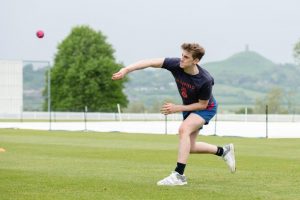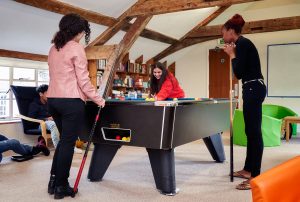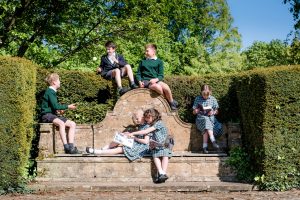How to have a good school closure. Maybe.
Today the sun is shining and the wind has dropped. When I step outside to gaze wistfully across the empty sports pitches I don’t have quite so much need of the full-length lacrosse coat that I managed to acquire from our PE department. I’m trying to follow my own advice you see. Step away from the screen, get some fresh air, it’ll make you feel better. And it does. Sort of.
I’ve been pondering how we can have a good school closure this time round. A good 2nd? 3rd? (does it really matter any more?) lockdown.
Last summer, in the early days, it was all about the mechanics of remote teaching. Could we work out how to share a screen, let a student out of a waiting room, upload work into OneNote, track down homework, correct it on your device and so on? Of course, these things still matter. To be honest, they really, really matter. In the frustrating, lockdown world, remote lessons in which the basics don’t work can feel overwhelmingly disastrous. Documents and video clips that don’t open, devices that don’t snyc and frozen participants on Teams calls all conspire to drive us to distraction. Sometimes it hardly feels worth getting out of bed in the morning.
Yet, judging by my stilted conversations with pupils over Teams this week, many of them are feeling surprisingly chipper. They appreciate the fact that their teachers are trying hard to engage them and to provide stimulating material although naturally they would rather be in the classroom, for the most part, because they miss their peers.
At St Swithun’s, most of our lessons are live, by which I mean that the teacher greets their pupils at the start of the lesson and explains the activities. She is likely then to leave the students to get on with some work on their own, in pairs or in small groups, but she is available to answer queries. The arrival of breakout rooms to Teams has much improved and extended the learning activities that can be offered, particularly since the teacher can pop into each breakout room to encourage, monitor or advise as appropriate. Thus, we seek to provide a mixture of teacher input and time for our pupils to consolidate their learning or indeed prepare for a lesson by working on their own or with others.
Nevertheless, however hard we try to mix up the content of the lessons, there is inevitably a lot of screen time. Therefore, we have encouraged teachers to set less homework for many classes, particularly KS3, so that the pupils can turn off their screens at the end of the day. Where teachers do feel that homework is essential for the pupils’ learning, it is important that as far as possible it doesn’t involve more time looking at a screen. We have just sent out a questionnaire so that we can assess our pupils’ experience and refine our teaching. It is so important to be responsive to their needs where we can.
As important as what happens in class, arguably more so, is how we operate remotely the rest of the time.
We still have assemblies three times a week as we feel that a shared experience is particularly important given the fact that we are not physically together.
Equally, we have continued with morning registration so that our pupils can get together with their friends for a few minutes. Seeing their form tutor each day helps them to feel connected.
We know that some of our pupils find being at home particularly hard so we carry out a fortnightly wellbeing temperature check. All pupils rate how they are feeling from 10 (on top of the world) to 1 (really struggling). We follow up on every pupil below 5 and on those who haven’t submitted a number. In many cases, a low score was a question of a particularly bleak moment rather than a trend, but we have also identified some pupils who need help. Our usual pastoral care is in place so it is easy for members of our welfare team to organise online sessions where appropriate.
After the restrictions of year group bubbles last term, the freedom to mix with different age groups in the online world has been a surprising benefit. Clubs like debating or reading radio plays have lent themselves well to this latest lockdown. Our Y7 pupils have particularly enjoyed starting to get to know older girls. Once again, it has proved straightforward to welcome many an eclectic selection of speakers to our academic lunches during which wide-ranging discussions take place. It was particularly delightful earlier this week to see some of last year’s upper sixth join us from Hong Kong, finding time amongst their university lectures.
House activities have continued for our boarders. The tradition of older pupils organising events for younger ones is important at St Swithun’s, and has so far led to activities such as a Pictionary Competition, an on-line quiz and much baking. We have also launched a whole-school competition which takes as its inspiration the tv show, TaskMaster. Providing opportunities for laughter has to be one of the most important things that we do.
More challenging is exercise, particularly given the grim January weather, even though we all recognise its importance. We have continued with PE lessons during this lockdown, adapting the activities to the reality of pupils’ living rooms and bedrooms. High intensity sessions, yoga, dance and Zumba have all featured. I wouldn’t claim that all pupils are involved, but the number engaged in organised PE lessons is definitely higher than during the first closure of schools.
Are we having a good school closure? In many ways, all things considered, for many pupils and staff the answer is yes. However, the real impact of this latest closure will undoubtedly not be felt immediately. How much learning, interpersonal skills, self-confidence and natural optimism will be lost? We can only wait and see.
Categories: Uncategorised







